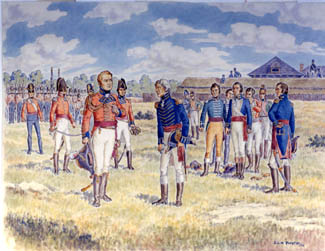
The War of 1812 doesn’t always receive the same attention as the American Revolution or the Civil War, yet it played a critical role in shaping the United States’ early years. Fought between the U.S. and Great Britain from 1812 to 1815, trade disputes, maritime conflicts, and territorial ambitions sparked the war.
Like other wars, its impact still lingers across North America, marked by preserved battlefields and thin ribbons. Though often overlooked, this war helped forge a stronger national identity and tested the resilience of a young republic still defining its place in the world.
Several overlapping issues led to the War of 1812, with rising tension between the United States and Great Britain at the forefront. One of the most controversial causes was the British practice of impressment, where American sailors were forcibly taken from U.S. ships and made to serve in the British navy.
In addition, trade restrictions resulting from Britain’s ongoing war with France severely limited American commerce. The U.S. viewed these acts as violations of its sovereignty. On land, American settlers faced resistance from Native American tribes, particularly in the Northwest Territory, who were increasingly supported and armed by British forces in Canada.
This connection added to American suspicions that Britain was undermining the country’s westward expansion. Driven by practical concerns and growing nationalist sentiment, a group of lawmakers known as the “War Hawks” pushed for military action. Their influence and unresolved maritime and territorial disputes made war seem inevitable by mid-1812.
The War of 1812 played out across multiple fronts, from the Canadian border to the Gulf of Mexico. Early in the war, the United States launched several unsuccessful attempts to invade Canada, facing strong resistance from British troops and their Native American allies. One of the war’s turning points came in 1813 with the American naval victory on Lake Erie, led by Commodore Oliver Hazard Perry, which gave the U.S. control of key waterways and boosted morale.
In 1814, British forces struck back hard. After defeating Napoleon in Europe, Britain redirected troops to North America. They captured Washington, D.C., and burned the White House and Capitol, a moment of national shock. Just weeks later, American defenders held Fort McHenry in Baltimore, inspiring Francis Scott Key to write the poem that would become “The Star-Spangled Banner.”
The final major battle took place in January 1815 at New Orleans, where General Andrew Jackson’s forces decisively defeated the British. Ironically, this occurred after the war had officially ended, though news had not yet reached the front lines. Throughout the conflict, battles were fought by a mix of professional soldiers, local militias, and Native American warriors, each shaping the war’s unpredictable course.
The war formally ended with the signing of the Treaty of Ghent on December 24, 1814. Negotiated in Belgium, the treaty essentially restored relations between the U.S. and Britain to their pre-war status. No territory changed hands, and the contentious issues of impressment and trade restrictions were left unresolved, largely because they had become irrelevant by the time of the treaty.
Though the agreement didn’t offer a clear victory for either side, it marked the end of armed conflict and allowed both nations to move forward. For the United States, it was a moment of relief and an opportunity to strengthen its footing on the world stage.
While the Treaty of Ghent settled few disputes, the War of 1812 had significant and lasting effects. It helped solidify the United States’ national identity, especially in the wake of the successful defense at Fort McHenry and the victory at New Orleans. Politically, the war contributed to the collapse of the Federalist Party, which had opposed the conflict and lost credibility in the process.
Economically, the war encouraged domestic manufacturing, as trade disruptions forced the U.S. to rely more on its own production. It also clarified the U.S.-Canada border and fostered a more stable relationship with Britain. For Native American nations, however, the outcome was devastating; many lost British support and saw their resistance to U.S. expansion significantly weakened.
Though often overshadowed by other conflicts, the War of 1812 marked a turning point in American history. It demonstrated the young nation's resilience and left a foundation for its future growth and independence.
The War of 1812 may not dominate history lessons, but its impact still resonates. It tested the strength of a young republic and proved that the United States could defend its sovereignty against a global power. The war sparked a wave of national pride, helped define borders, and set the stage for future growth.